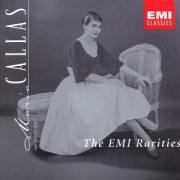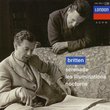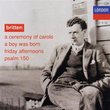| All Artists: Vincenzo Bellini, Gaetano Donizetti, Wolfgang Amadeus Mozart, Gioachino Rossini, Giuseppe Verdi, Carl Maria von Weber, Antonio Tonini, Georges Prêtre, Nicola Rescigno, Tullio Serafin, Maggio Musicale Fiorentino Orchestra, Paris Conservatory Concert Society Orchestra, Paris National Opera Orchestra, Philharmonia Orchestra of London, Maria Callas, Alexander Young Title: Maria Callas - The EMI Rarities (EMI) Members Wishing: 0 Total Copies: 0 Label: EMI Release Date: 1/20/1998 Album Type: Import Genre: Classical Styles: Opera & Classical Vocal, Historical Periods, Classical (c.1770-1830), Modern, 20th, & 21st Century Number of Discs: 2 SwapaCD Credits: 2 UPC: 724356646827 |
Search - Vincenzo Bellini, Gaetano Donizetti, Wolfgang Amadeus Mozart :: Maria Callas - The EMI Rarities (EMI)
 | Vincenzo Bellini, Gaetano Donizetti, Wolfgang Amadeus Mozart Maria Callas - The EMI Rarities (EMI) Genre: Classical
|
Larger Image |
CD DetailsSimilar CDs
|
CD ReviewsCallas from the vaults Tsaraslondon | London, UK | 07/15/2006 (5 out of 5 stars) "This anthology (released in 1997) is a compilation of material from the vaults of EMI, some of it released for the very first time, and all, except the "Macbeth" Sleepwalking scene, after Callas had died. In other words, material that Callas did not approve for release. In the case of the "Macbeth" aria, it was discovered that the closing section on the mono vesrion differed slightly from the stereo version, and was interesting enough to publish separately. In this case the difference, is very slight. We do hear Lady Macbeth moving off into the distance in this version, but otherwise it is as excellent and inimitable as the stero version. Indeed, no other Lady Macbeth comes within a mile of Callas's dramatic insight and musical perspicacity. For the rest, we have Callas in variable voice, not surprising as there is a 16 year gap between the first and last of these recordings. We have both test versions of Donna Anna's "Non mi dir" from "Don Giovanni". These were made just prior to her first studio recording of "Lucia di Lammermoor", and were made to give the engineers a feel for the voice. Differences between the two performance are again slight, the miking being slightly more becoming in the second version. In both versions, Callas sails through the aria as if it was the easiest thing in the world (it isn't) and gives the lie to people who say she couldn't sing Mozart. Her legato in the first part of the aria is, as usual, perfection, the breath control prodigious, and of course the coloratura of the second part holds no terrors for her whatsoever. Moreover, she invests the notes with a character lacking in many other versions of this aria. After all the words are "Perhaps someday Heaven will take pity on me", sentiments often forgotten by sopranos wishing to show off their technique. The rest of this disc is taken up with alternative takes of material, that were released during Callas's lifetime. The majority is from sessions recorded between 1960 and 1961 with Antonio Tonini conducting. Though she is in fesher voice here, than she was when she re-recorded them with Nicola Rescigno, the later verions are often preferable, being more committed. However I do prefer the version of Cenerentola's aria published here to the one that eventually appeared on her Rossini/Donizetti Arias disc. You will probably want to know about the "Aida" scene with Corelli. To be honest, I found this vocally rather trying, though certain things, like the insinuating way, she sings "se tu m'ami" are incomparable. Corelli is in terrific voice, making one regret that he wasn't used on Callas's complete set, recorded 10 years before. The biggest surprise is the last 3 arias, recorded in 1969, 4 years after Callas's last stage appearances. The "Vespri Siciliani" and "Attila" arias are actually preferable to the 1965 takes, both sung more smoothly and with lovely, gentle tone. The tessitura of the "Lombardi" troubles her more, and this is rather trying to listen to. However, when genius is involved, as it most definitely is here, then we can make allowances. Callas's musical and dramatic instincts never let her down, even when her voice does. We will never hear her like again, and we are the richer for having these performances, even if the diva herself would have prefered us not to hear them." Maria Callas In Great Studio Voice Rarities Ralph Moore | 05/16/2005 (5 out of 5 stars) "What year was this recording made ? She sings arias from great operas with the Paris Opera orchestra. EMI did much for distributing Callas records during the post World War II Era and culminating in the late 70's. Maria Callas continues to be a much talked about opera singer, and were she alive today, she'd revel in it, even in the mixed praises. For some, Callas had a big voice, no doubt, but it was "ugly" (actual quote), it was wobbly, it was choked, it was forced, as if she were dying. But that's only because Callas found that opera was a passion, and it was indeed a matter of life and death for her. Opera was her life and it was her death. She lost her voice in the 70's, her illustrious career, which read like that of a Hollywood movie star- complete with Audrey Hepburn image- ended in a disastrous concert in Japan. She died in 1977 in her Paris apartment, almost like Violetta in the last act of La Traviata. In this recording, we find her in great voice, though I'm no expert on Callas. Most collect the earliest recorded material- 40's and 50's. In concert in Paris, we find she has a vast repertoire and glorious dramatic technique. "Ocean, Thy Might Monster" she sings in its original English, with excellent English diction and powerful lungs. She sings "O Don Fatale" from Verdi's Don Carlo, a role that is usually given to dramatic mezzo-sopranos. But her interpretation takes the crown. An aria from Aida, "Non mi dir" from Don Giovanni, sounding graceful and tortured as Dona Ana pleads with her fiance to be patient with her, for she is still in mourning for her dead father. Everything on here is a string of pearls and all fans will not regret owning this album. Thank you EMI for giving us the great singers on record." Quintessential Callas, usually for much better and just occa Ralph Moore | Bishop's Stortford, UK | 07/29/2010 (5 out of 5 stars) "This double disc set is easily confused with the earlier, single disc EMI release "Maria Callas - Rarities" (same cover picture but in colour). There is some duplication but some items on the older compilation, such as Beethoven's concert aria "Ah! perfido" and Mozart's "Tutte le torture", have now been dropped and other items included. The recordings here span 16 years and none except the excerpt from "Il pirata" was published in Callas's lifetime. In a sense, this collection could be said to appeal only to true Callas aficionados, in that the diva's struggles with her wobbling top notes post 1961 are only too frequently in evidence and explain EMI supremo Walter Legge's warning to Callas that he would have to issue sea-sickness pills with her records if she was not able to control it. Oddly enough, there is ample evidence here that she often did manage to do so, such that it not always necessary to flinch before top notes. There is also ample proof, as I have previously and frequently observed, that the decline in Callas's voice was not linear or exponential; she often sounds in better shape in recordings from 1969 than she does four, or even seven, years earlier. In many ways, I enjoyed those late items most, because I was so surprised to find Callas's voice in such good shape so late and also because she does some exquisite things interpretatively. Of course, there are always beautiful things in a Callas performance. Her artistry and insight will invariably compensate for vocal frailities; it is very much a personal judgememt how much. For me, those last, three Verdi arias from 1969 are a revelation. On a couple of occasions there is evidence of some clumsy splicing, but she is in richer, fuller, more confident voice than we have any right to expect and certain phrases etch themselves indelibly into my consciousness and heart in that inimitable Callas manner. All three arias are of a melancholy, plaintive character; she does not have to force and can justify resorting more often to floated pianissimi top notes, with far more attractive results than those near-shrieks from recordings earlier in the 60's, which flap so distressingly.
So for me the "bad patch" come between 1962 and 1964. Many potential purchasers will be attracted, as was I, by the prospect of hearing Callas and Corelli in "Aida" in 1964, but it cannot in truth be said to show either artist to any great advantage: Corelli's lisp is much more pronounced than I have ever previously heard it and his interpretation is a bit clumsy, if visceral and impassioned; Callas is rather thin, hollow and unsteady of voice - yet this is still a valuable souvenir of a partnership which endured from 1958 until Callas's retirement in 1965, and even here there are wonderful things. And despite my identifying this as one of the rockier periods in Callas's career, her "Nacqui all'affano" is a gem, superior to the one released on her 1963 Rossini/Donizetti recital album. Her coloratura is admirable, as is her habitual ability to colour the words. The earliest items here are EMI's two test recordings in 1953 of the same Mozart aria, "Non mi dir". Honest listening will concede that there was not so much deterioration in her voice between this assured delivery of a deceptively difficult aria and her last recordings: the same virtues and faults are in evidence - and, more importantly, the same ability to pierce the music she is singing to its emotional core. The mono version here of the famous "Macbeth" aria adds little to my appreciation of Callas's Lady, in that I already considered it to encapsulate everything which is compelling about her as a supremely dramatic singing-actress; the stage effect of her retreating from the microphone at the end is interesting but the stereo release of the recital record conducted by Rescigno is obviously superior. Comparison between the 1960 and the 1969 versions of "Arrigo! ah, parli a un core" again confirms that the toll on the voice of nine turbulent years was not as great as popular wisdom would have it. I hesitated to give this compilation five stars; after all, if Callas, who was fiercely self-critical, refused to sanction release of most of them during her lifetime they must be inferior, no? But of course that is only in comparison with herself; measured against the achievements of other sopranos as a whole, these discs are replete with captivating singing." |

 Track Listings (9) - Disc #1
Track Listings (9) - Disc #1

